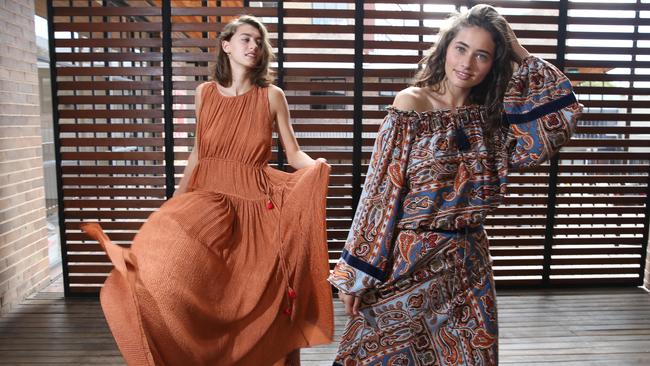Sustainability comes into vogue for Tigerlily
Global fashion is facing increasing scrutiny of its supply chains, from labour and manufacturing through to environmental impact.

Transparency is trending — well beyond sheer chiffon.
The global fashion industry is facing increasing scrutiny of its supply chains, from labour and manufacturing through to environmental impact, given its position as one of the world’s most polluting industries.
Sydney fashion label Tigerlily today releases its first Consciousness Report, seven months in the making, which outlines for customers the first five years of its journey to improve sustainability and ethical production practices.
“Sustainability for us is not a destination,” Tigerlily chief executive Chris Buchanan said. “It’s a continuous journey of exploring and addressing ethical, environmental and social impact.”
While a number of younger brands are being built on sustainable practices, established businesses, such as the 18-year-old Tigerlily, often have to retrofit them into their existing business models. Given the complex global supply chains within the industry — from farming of raw materials to fabric milling, manufacturing, packaging and transportation — “it’s a very difficult and challenging task”, Mr Buchanan said.
Aspects the company has addressed include ethical production certification for its labour force, and increasing the use of natural fibres, recycled yarns, and fabric produced with Lenzing certificaton, meaning made from renewable wood supplies using a closed-loop system that includes the fabric being, ultimately, biodegradable.
The company has also switched from traditional plastic packaging to a version that breaks down in water, and plans to switch to compostable within 12 months. Air freight has been reduced and overtaken by sea freight to reduce carbon emissions.
Mr Buchanan said the next big question for the brand — and the fashion industry — was how to recycle products at the end of their lives.
“I don’t have the solution,” he said. “We are in no way perfect. But we’re happy to be transparent and have these conversations because it forces everyone in the industry to come together to solve these complex issues.”
Writer and sustainability consultant Clare Press has reviewed the Tigerlily report, and said she was surprised at how closely the company had looked at its carbon footprint, among other elements.
Press said international brands such as Nike, Adidas and Levi’s all released such reports, and praised Byron Bay label Spell & the Gypsy Collective for recently doing so. She believes the Country Road Group is also doing a good job of communicating its sustainability work to consumers.



To join the conversation, please log in. Don't have an account? Register
Join the conversation, you are commenting as Logout